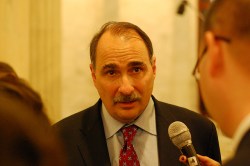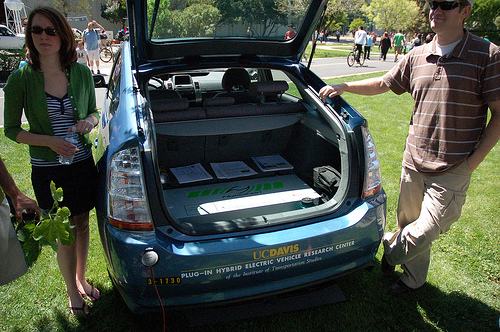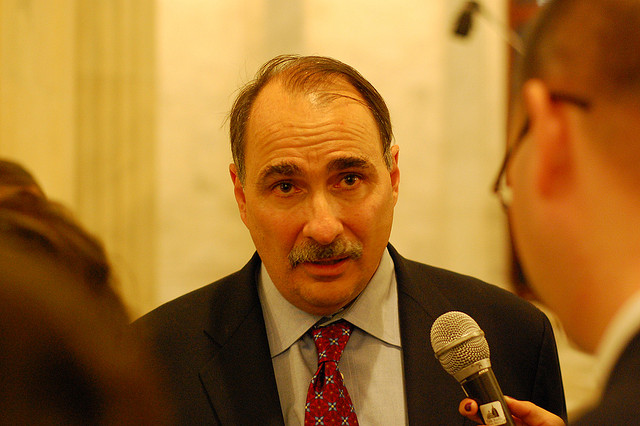
Talk Radio News ServiceDavid Axelrod.
“It was always going to be the case that whenever the visible reality of climate change became so painfully obvious that you couldn’t deny it any more, that it was going to flip over to a winning issue. The question was: When was that going to happen?”
So spoke Joseph Romm, the former Clinton energy official and popular blogger behind Climate Progress, at the first Climate Desk Live briefing at the Mott House on Capitol Hill in Washington, D.C. Romm and his fellow panelists — strategist Betsy Taylor of Breakthrough Strategies and Solutions and consultant Paul Bledsoe, who worked in the Clinton White House on climate communications — were in strong agreement that the weather of the last year has transformed climate change into the type of issue that could impact the 2012 election, simply because most Americans now feel directly affected by it. That emphatically includes independents and swing voters.
“One of the problems with climate change is it’s always been distant and remote. This year’s weather made it immediate,” Taylor explained. She showed previously unpublished data from a Harstad Strategic Research survey from May of 2012, showing that 59 percent of Americans agreed that the weather in their area had gotten more extreme or unpredictable over the past several years — and 68 percent agreed that the weather was more volatile than it was during their childhood.
But while national polls may show that the climate issue appeals to independents, the campaign is being fought in a small number of battleground states — Colorado, Florida, Ohio, Virginia, and so on. At the briefing, the question arose whether the campaigns may have more detailed and granular analyses, suggesting that the issue won’t actually help them in these critical swing states. Could that explain why they’re ignoring climate?
The panel was having none of it. If anything, Bledsoe argued, many of the 2012 swing states ought to be better places for climate messaging, in light of the extreme weather they’ve experienced. “Colorado and New Mexico are two swing states that have experienced extreme wildfires,” he pointed out. And “Florida is on the cutting edge of climate change for a whole variety of reasons, not the least of which [is] extreme weather but also sea-level rise.”
“We’re reaching now the point where almost every state is getting some sort of extreme weather event that is off the charts, including that derecho that ripped across the country and went into Virginia,” Romm added. He cited a recent poll [PDF] from Yale University and George Mason University researchers, breaking down concern about global warming by U.S. regions. In the Midwest, for instance, the perception that droughts are getting more common has shot up 25 percentage points since March, to 66 percent.
So why, then, aren’t politicians like Obama taking up climate change messaging to win votes? Taylor said that following the economic collapse of 2008, this was a more or less a conscious strategy. “By the spring of 2009, with the fiscal crisis, there was a decision made, and adopted, not to talk about climate change,” she related. “That was adopted by the majority of the environmental groups, and by the White House. I was at that meeting. Bill McKibben stood up and said, ‘This is a mistake — it’s going to come back and haunt us.’” Talking about clean energy jobs was fine, she continued. But the “C-word” was a no-go.
Romm went further. Asked if there was some individual giving politicians bad strategic advice, he commented, “I will absolutely blame someone. Because I have relatively high confidence, based on conversations I’ve had, that [senior Obama adviser] David Axelrod is the guy who shut down a lot of this talk. And even went up to the Hill and told the Dems not to message the climate science.” Bledsoe added that the scarring experience of failing to pass the Waxman-Markey cap-and-trade bill in Congress probably led many Democrats to back away from the issue.
All three panelists agreed that while extreme weather gets Americans to care about climate change, if no solution is offered, people feel overwhelmed, and ultimately fatalistic. The way to get past this, explained Taylor, is to talk about the strength of American ingenuity, and its ability to solve the problem of global warming through new clean energy technologies. In the polling data she presented, 84 percent of Democrats found such a message convincing, as did 61 percent of independents — even 46 percent of Republicans.
For a long time, Americans viewed their shared purpose as “protecting the free world,” Bledsoe elaborated. Taking on climate change could inspire people to think once again about “what makes America great, what makes it special.” It can “tap into the notion of American exceptionalism and American greatness.”
But not if politicians don’t get past the notion that climate change is a political loser. Such thinking has been refuted by a wave of new data, sampling both national and local audiences. Now, the issue simply awaits its political champion.
Watch highlights from the panel below (and check out the full video here):
 This story was produced as part of the Climate Desk collaboration.
This story was produced as part of the Climate Desk collaboration.



